- Published on
UTCTF 2025 - Reverse Engineering challenges
Introduction

Ostrich Algorithm
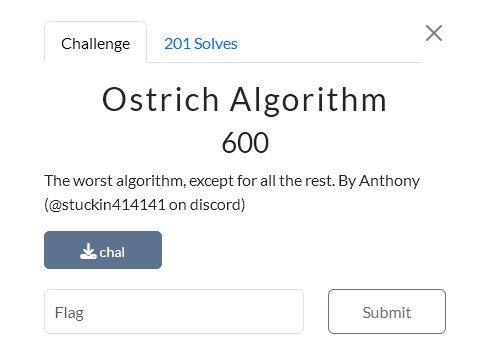
Writeup author: zBlxst
.rodata (not sure). If the ckecks passes, it prints the flag. I just changed the thing in the .rodata to pass the check. 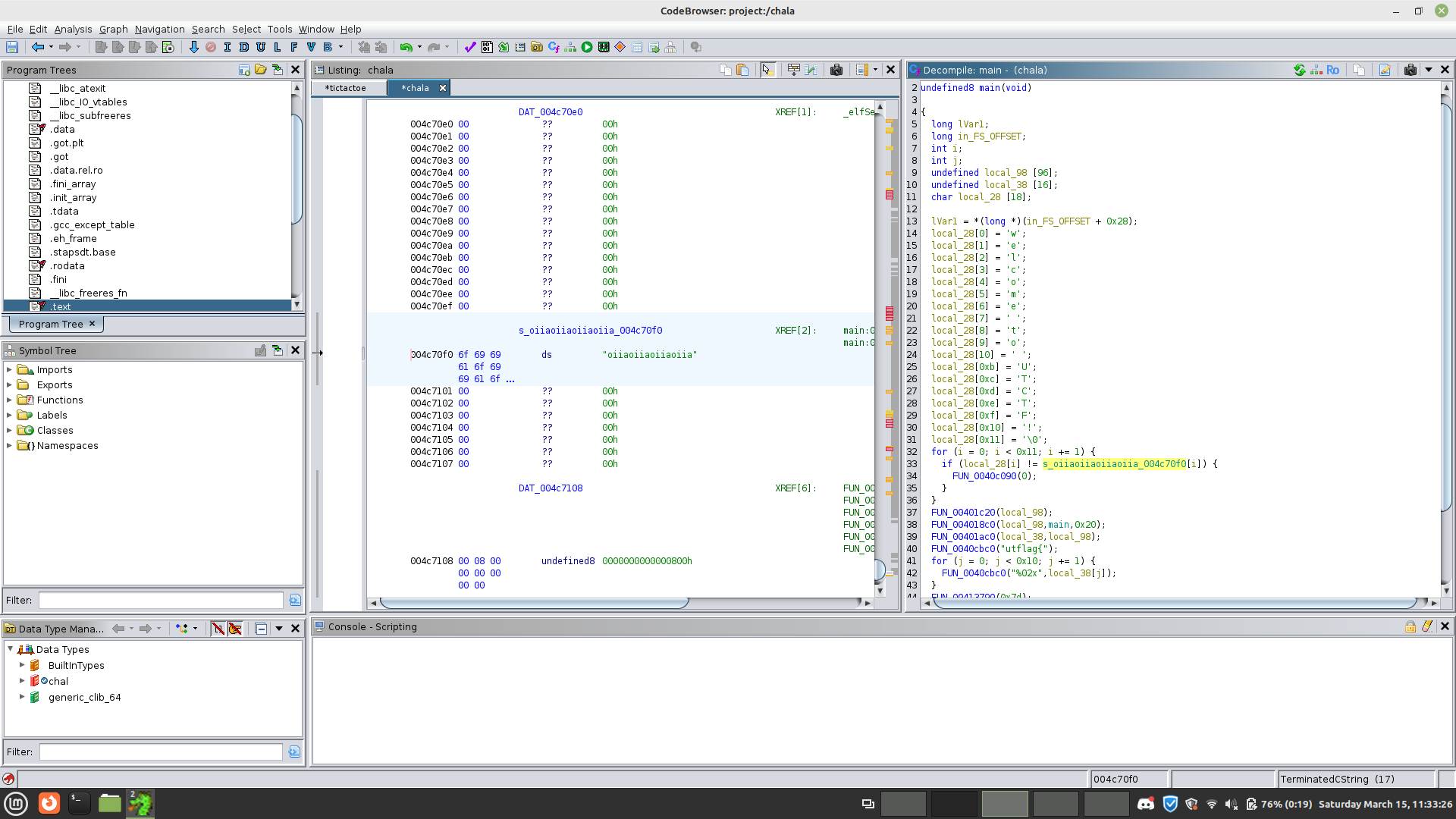
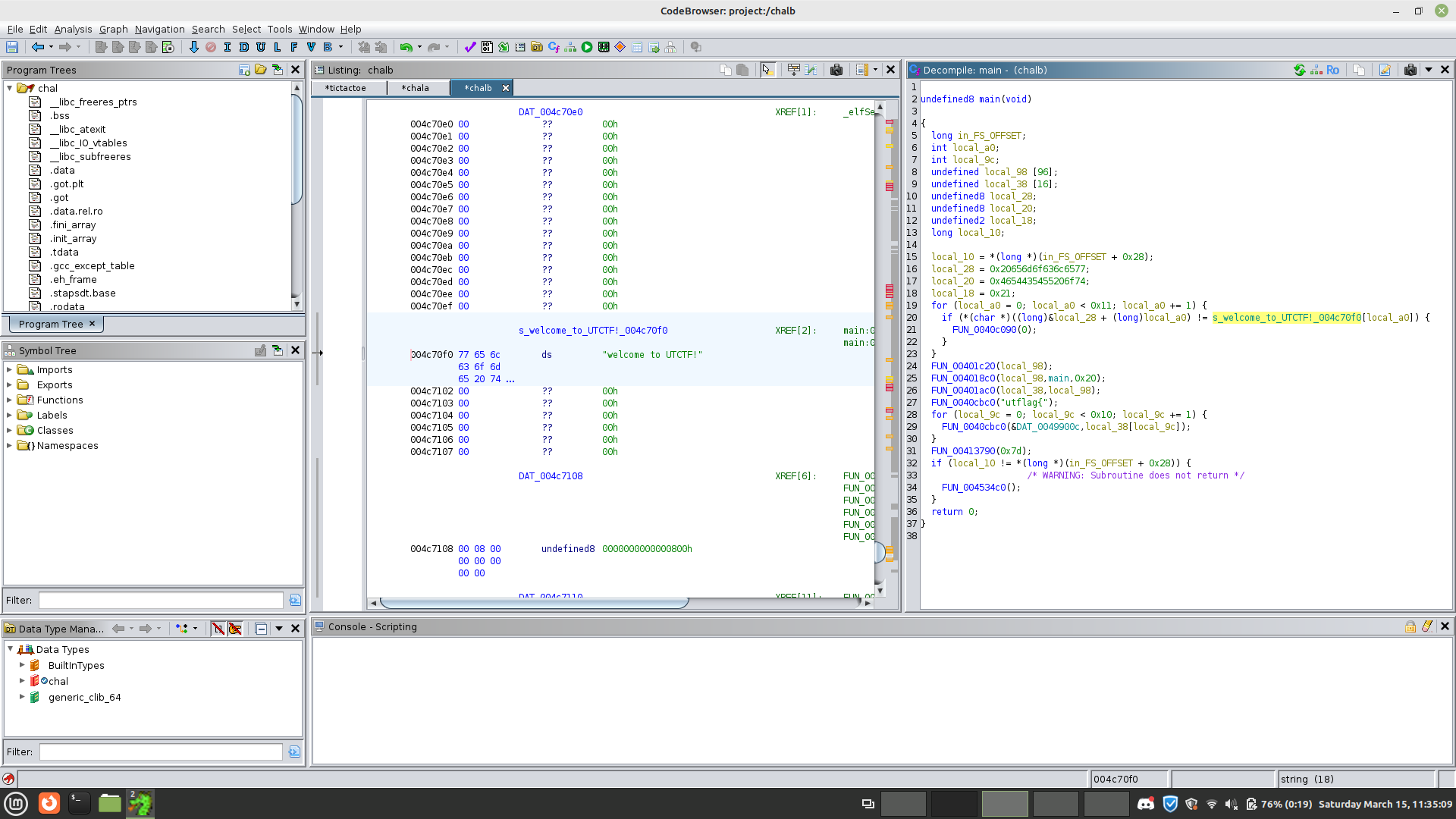
utflag{d686e9b8f13bef2a3078c324ceafd25d}
Retro Cookie Clicker
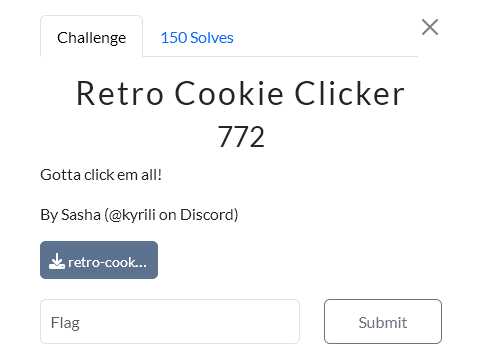
Writeup author: kerszi
The goal of the game was to overflow the counter (dozens), meaning reaching 7FFF, but who would click that many times... To do this, I used Mesen. I checked which value changed when I started clicking and discovered that it was at address $0B94. So, I simply set it to the highest possible value 07FF (32767), clicked once, and got the flag.
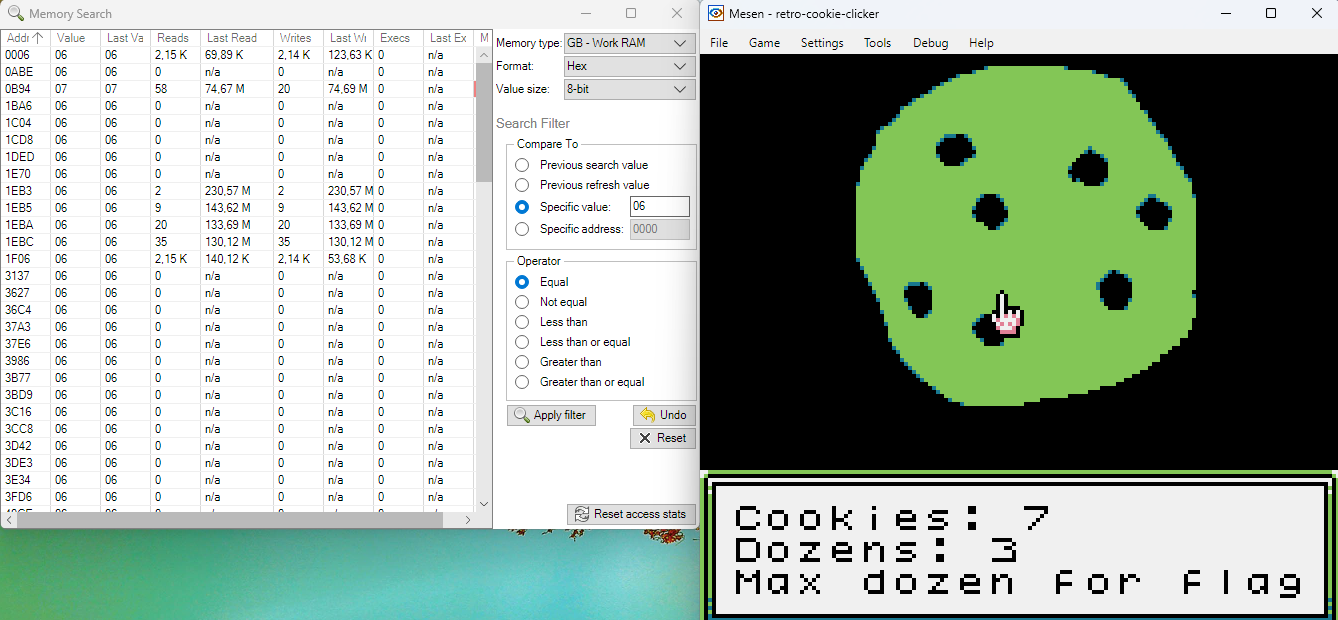
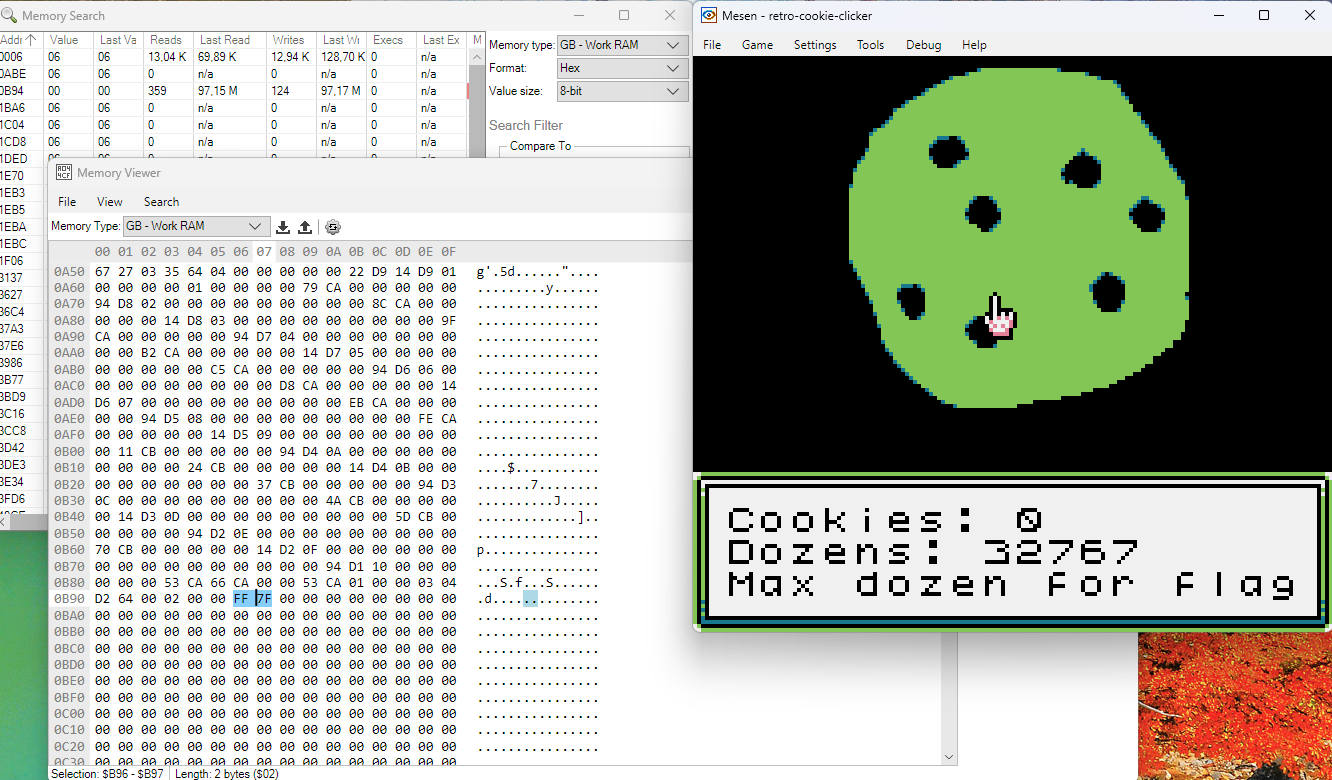
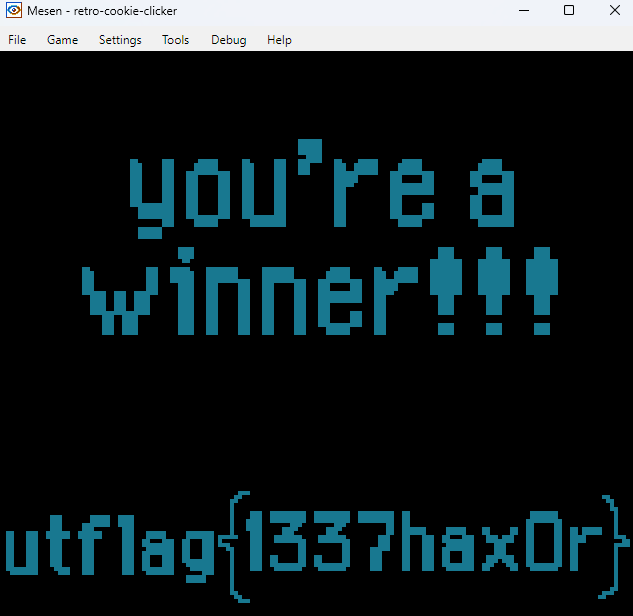
utflag{1337hax0r}
Safe Word

Writeup author: zBlxst
I takes a while to run, but it works. To speed up, you can stop the program, take a state of "new_found" and put it in "found" (and remove weird things). It took me like 2 hours to run.
from pwn import process, context
context.log_level = "CRITICAL"
with open("safe_word", "rb") as f:
content = list(f.read())
for i in range(0, 0x21):
content[0x133D8] = i
with open(f"safe_word_{i}", "wb") as f:
f.write(bytes(content))
import string
found = ['']
new_found = []
for j in range(len(found[0]), 33):
print(f"Program {j}")
for f in found:
for i in range(128):
if chr(i) not in string.printable:
continue
print(i)
p = process(f"./safe_word_{j}")
# print(p.recv())
p.sendline((f+chr(i)).encode())
p.wait_for_close()
poll = p.poll()
if poll == 0:
print(f + chr(i), poll)
new_found.append(f + chr(i))
p.close()
if len(new_found) == 0:
print("Not Found")
exit(0)
print(new_found)
found = new_found
new_found = []
print(list(map(lambda x: x.endswith("}"), new_found)))
utflag{1_w4nna_pl4y_hypix3l_in_c}
Maps

Writeup author: Lazarus
After analyzing the executable, I found that each flag character is encoded as five digits. The given output is the encoded flag, and because each input is converted to a digit string, we can brute-force it to reveal the flag's characters one after one.
import subprocess
import string
target = "4934849349493674935749360493664940249346493534935849348493574936549351493644937449348493464936449365493744935349360493464935449364493574935749374493494935349358493594935449404"
alphabet = string.printable # letters, numbers, symbols
def get_program_output(input_string):
process = subprocess.Popen(['./chal'], stdin=subprocess.PIPE, stdout=subprocess.PIPE, text=True)
output, _ = process.communicate(input=input_string + '\n')
output = output.strip().replace("Transform! ", "")
return output
def brute_force_flag():
flag = ""
target_pos = 0
while target_pos < len(target):
for char in alphabet:
test_flag = flag + char
output = get_program_output(test_flag)
if output[:len(test_flag) * 5] == target[:len(test_flag) * 5]:
flag = test_flag
target_pos = len(flag) * 5
print(f"Match: {char} | Current flag: {flag}")
break
else:
print("No match found for current position!")
break
return flag
print("Starting brute-force attack...")
final_flag = brute_force_flag()
print(f"\nFinal flag: {final_flag}")
Starting brute-force attack...
Match: u | Current flag: u
Match: t | Current flag: ut
Match: f | Current flag: utf
Match: l | Current flag: utfl
Match: a | Current flag: utfla
Match: g | Current flag: utflag
Match: { | Current flag: utflag{
Match: s | Current flag: utflag{s
Match: h | Current flag: utflag{sh
Match: o | Current flag: utflag{sho
Match: u | Current flag: utflag{shou
Match: l | Current flag: utflag{shoul
Match: d | Current flag: utflag{should
Match: v | Current flag: utflag{shouldv
Match: e | Current flag: utflag{shouldve
Match: _ | Current flag: utflag{shouldve_
Match: u | Current flag: utflag{shouldve_u
Match: s | Current flag: utflag{shouldve_us
Match: e | Current flag: utflag{shouldve_use
Match: d | Current flag: utflag{shouldve_used
Match: _ | Current flag: utflag{shouldve_used_
Match: h | Current flag: utflag{shouldve_used_h
Match: a | Current flag: utflag{shouldve_used_ha
Match: s | Current flag: utflag{shouldve_used_has
Match: k | Current flag: utflag{shouldve_used_hask
Match: e | Current flag: utflag{shouldve_used_haske
Match: l | Current flag: utflag{shouldve_used_haskel
Match: l | Current flag: utflag{shouldve_used_haskell
Match: _ | Current flag: utflag{shouldve_used_haskell_
Match: t | Current flag: utflag{shouldve_used_haskell_t
Match: h | Current flag: utflag{shouldve_used_haskell_th
Match: o | Current flag: utflag{shouldve_used_haskell_tho
Match: n | Current flag: utflag{shouldve_used_haskell_thon
Match: k | Current flag: utflag{shouldve_used_haskell_thonk
Match: } | Current flag: utflag{shouldve_used_haskell_thonk}
Final flag: utflag{shouldve_used_haskell_thonk}
utflag{shouldve_used_haskell_thonk}
